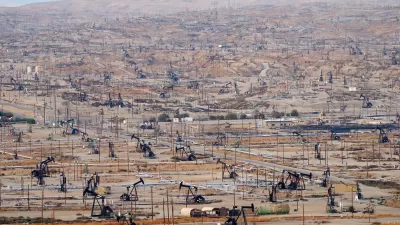While billed as an "anti-fracking initiative," Measure Z in Monterey County, the 4th-largest oil-producing county in California, does far more. It bans new oil drilling and requires the cleaning of wastewater from current drilling operations.
While Measure Z is commonly referred to as the "anti-fracking initiative," there is no fracking in the county, for good reason.
"According to a representative for California’s Division of Oil, Gas, and Geothermal Resources (DOGGR), it...isn’t the most effective way to get the thick crude oil out of San Ardo’s ground, which is where the majority of the county’s oil production takes place," reports Brittany Nielsen for KSBW.
Steam injection is the most effective way. According to the state Department of Conservation, 15 times more water than oil is taken out of the ground in that proc
And that wastewater has to be disposed of. Readers may recall that the disposal of wastewater from drilling operations in Kansas, Texas, and Oklahoma has been associated with a flurry of earthquakes, the most powerful being a 5.6 quake in Oklahoma in September. In addition, they were likely the cause the earthquakes in Kern County in California in 2005.
However, Measure Z isn't aimed at seismic activity. It's focused on cleaning the wastewater.
About a third of that wastewater is currently cleaned through reverse osmosis, put in ponds, and percolates back into the ground. The rest is re-injected back where it came from, and that is what Measure Z would no longer allow, unless the water is cleaned.
Under the measure, a spokesperson for the Pro-Measure Z group, Protect Monterey County, says operators would need to first clean wastewater, and that would require expensive treatment plants to continue oil production as it currently exists.
Taken together with the prohibition of new drilling, it would well mean the end of oil drilling in the county, claim the measure's opponents, which would have a dire financial effect for all recipients of their property taxes. An image on the video (1:56) shows that during the 2015-16 fiscal year, schools received $5.476 million and the county $2.157 million.
Monterey County Weekly endorses the measure:
When opponents of Measure Z say it would do more than ban fracking, they’re right: It would force the industry to adapt within its existing footprint, treating all of its water and finding a new way to dispose of wastewater. We think that’s a good thing.
By this correspondent's tracking, Measure Z is the fifth "anti-fracking initiative" placed on county ballots.
Two years ago at this time, San Benito, Santa Barbara, and Mendocino County had such measures. Only the Santa Barbara measure failed, "the only one of the three places where well operators use the technique, and where they are seeking to expand it," according to KPCC.
Butte County (where Chico is located) passed a fracking ban last June with 70 percent of the vote.
“If they win in Monterey, it sets a precedent,” Amy Myers Jaffe, executive director for energy and sustainability at the University of California, Davis, told Amy Harder of The Wall Street Journal. “It would show there’s real political force behind this movement.”
Even if Measure Z should pass — litigation will likely follow over the issues of state vs. county regulation and whether the measure constitutes a 'taking.'
Related:
- Wall Street Journal: Can Fracking Bans Succeed in Oil and Gas Country? All Eyes Are on Monterey, Nov. 3, 2016
- Ballotpedia: Monterey County, California, Ban on Oil and Gas Drilling, Measure Z (November 2016)
Also on Planetizen:
-
Drilling Bans on Three California County Ballots Today, November 4, 2014
- Fracking Wastewater Dumped into Protected California Aquifers, October 9, 2014
Thanks to Katie Herzog of Grist for reporting on:
- Florida’s Amendment 1 is an anti-solar ballot measure disguised as a pro-solar ballot measure.
- Nevada’s Question 3 would amend the state constitution to break the monopoly that utility NV Energy currently has on the electricity market.
- Colorado’s Amendment 71 appears to be “raising the bar” for amending the state constitution, but it could limit fracking bans and grassroots environmental action.
FULL STORY: Is Measure Z really about fracking Monterey County?

Maui's Vacation Rental Debate Turns Ugly
Verbal attacks, misinformation campaigns and fistfights plague a high-stakes debate to convert thousands of vacation rentals into long-term housing.

Planetizen Federal Action Tracker
A weekly monitor of how Trump’s orders and actions are impacting planners and planning in America.

Chicago’s Ghost Rails
Just beneath the surface of the modern city lie the remnants of its expansive early 20th-century streetcar system.

Bend, Oregon Zoning Reforms Prioritize Small-Scale Housing
The city altered its zoning code to allow multi-family housing and eliminated parking mandates citywide.

Amtrak Cutting Jobs, Funding to High-Speed Rail
The agency plans to cut 10 percent of its workforce and has confirmed it will not fund new high-speed rail projects.

LA Denies Basic Services to Unhoused Residents
The city has repeatedly failed to respond to requests for trash pickup at encampment sites, and eliminated a program that provided mobile showers and toilets.
Urban Design for Planners 1: Software Tools
This six-course series explores essential urban design concepts using open source software and equips planners with the tools they need to participate fully in the urban design process.
Planning for Universal Design
Learn the tools for implementing Universal Design in planning regulations.
planning NEXT
Appalachian Highlands Housing Partners
Mpact (founded as Rail~Volution)
City of Camden Redevelopment Agency
City of Astoria
City of Portland
City of Laramie




























